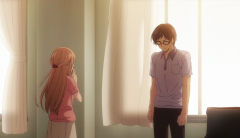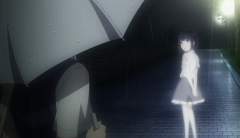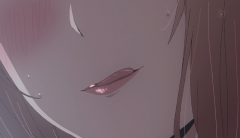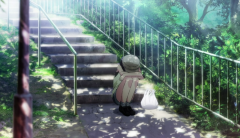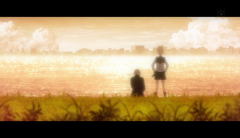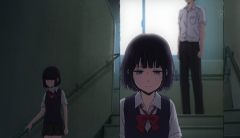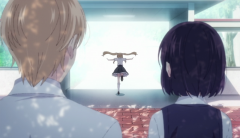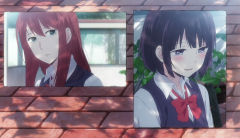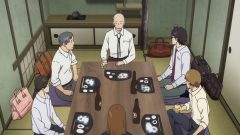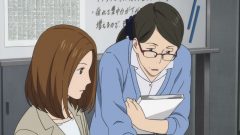This was a sublime episode from start to finish. By showing these tales of love through fragments from many characters’ point of view, it adds more layers, as well as more perspectives to this webs of broken desires. Normally this approach of focusing of fragments mean that the story can become disjoined; but not here. Every small stories in this episode matter and it keeps sinking us to its muddy swamp. And yes, the music in this show is incredible; if you listen closely there’s a distinctive theme for its stories and it really helps to elevate the mood for each segment; like how you could feel a seedy sense in Akane-sensei story, or a false mood of sweet, dream-like quality in Narumi-sensei part. Again I’ll discuss each of the theme in last week’s format, as I see it as the most appropriate format to squeeze out most of what this show tries to convey.
“Being desired by men. There’s no greater feeling than that”
Turn out that our sweet Akane-sensei isn’t sweet at all, but a manipulative bitch. That might sound negative but in truth this is a kind of character that works really well in this story. She isn’t your typical bitch after all, as she’s the most observant one out of all characters in this story. She is the only one who sees through many intertwined love nets and really the only one who can sees through Hanabi. Using her attractiveness as a weapon isn’t something utterly terrible, but what is remarkable about her character is how she’s playing up her attractiveness mainly for wrecking other girls, for them to feel the pain of seeing the one they love taken away by her. She said she doesn’t aim for superiority but all I can see is superiority plays a significant role here, since all she wants is attention from men and the hurtfulness from girls. I love the way she recognizes that Hanabi is pretty much on the same side as her, by neglecting the one sided love of other (Moca). The true Akane is anything but pretty, but now at least she’s real. What impressed me the most is the way the show underlines her sexiness and her thrust of physical consumption; not through big boobs, sexy clothes or suggestive behaviors, but merely by her sweating. Hooray for solid characters writing here.
“I decided to believe it was fate”
The next segment was told from the point of view of Narumi-sensei, on how he was attracted to Akane and thus become her unfortunate prey to play with. This story is slight and the least impactful compared to other segments, but I still found it interesting because out of anything, the first impression he had towards Akane was directly tied to his memories of his long-lost mother. It furthers detailing his long searching for a feminine figure all his life, and really that was a false picture that he incidentally subjects Akane to be and that was the reason why he’s blind be this affection. In the end, things that too good to be true are more likely deceptive in nature so I really hope he’s sensitive enough to figure out the true Akame on his own (would be really disappointed if he can’t).
“I want you to be filled with me”
Last but not least we have a development to Ecchan and Hanabi relationship as they sunk deeper to love confusion. There’s always a distinctive border between friend and lover and now they crossed that line, each for their own selfish reasons. Hanabi both needs Ecchan as a way to escape her own heartbroken from Narumi (which I can totally feel for her), and because she still needs and loves Ecchan as a friend. Ecchan likewise knows all this, but she’s determined to use every opportunity to have Hanabi all by herself. What they both know but too afraid to acknowledge is that once they crossed that line, they can never be back to “just friends” again. That image of little Hanabi disgusted with her current self sums that sense up pretty nicely and for me the best moments out of this already excellent episode. Scum’s Wish stands on a very firm ground here, as the story keeps maintaining its confidence take on the line between physical desires and emotional desires, on how the characters keep using the former as the substitute for the latter (the first and the last segment directly tied to this), but end up being more lonely and suffering. I know a lot of viewers have been turned off by its depressing nature but all I can say is guys, you might miss out one of the more thought-provoking look on relationship here.

